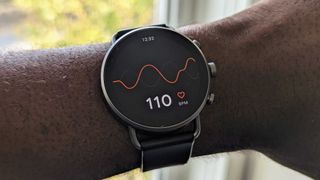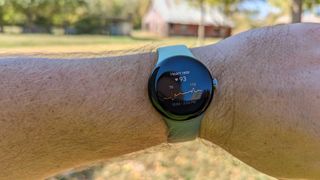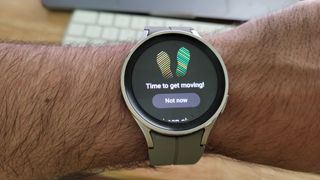When it comes to your health, don't place too much trust in your smartwatch
Use your brain as well as your wearable

We've all seen stories about how a smartwatch "saved someone's life" by letting them know their health was out of whack in time to see the doctor. Companies love those kinds of tales, so they make sure we see them. I've no doubt they are true and that people have been warned by their wearable.
That doesn't mean you should rely on it happening for you.
I just went through one of the scariest moments of my life — a reaction to a new medication caused a type of cardiac event. That's a fancy medical term for when it feels like your heart is in your throat, beating a million miles an hour, making you dizzy and confused. Your eyes can start painfully throbbing, too. I thought I was having a heart attack and was going to die.
I wasn't, thankfully, and found out it was an episode of Paroxysmal Atrial Fibrillation caused by a reaction to a new medication. The E.R. doctors and resident cardiologist quickly sorted things out, and though I did have a second episode while I was laid up and the medicine was still in my system, the doctors cautiously told me I'd be fine. I flushed the remainder of that medication.

During both episodes, I was wearing my Galaxy Watch 4. During the second episode, when I wasn't 100% convinced that the grim reaper was coming, I even ran the built-in heart rate monitor, and my watch thought everything was A-OK. To make matters worse, the wires and expensive machinery attached to me and my smartwatch were often 15-10 units apart regarding my heart rate.
Because I am a nerd, I talked to the cardiologist about it. He was adamant that it's dangerous for people to trust their life to a (relatively) cheap piece of tech that uses LEDs. He called out one brand that claims continuous heart rhythm monitoring in particular. "Use them as a secondary tool in addition to regular check-ups with your doctor, but don't rely on them alone," was his sage advice.
I get it. The first thing you need to always remember is that manufacturers have to use the cheapest method and parts possible. To read your heart rate, your smartwatch flashes a set of green LEDs and a set of photo-receptive diodes that read the reflected light.
Be an expert in 5 minutes
Get the latest news from Android Central, your trusted companion in the world of Android
Smartwatch tech is cool even if it's not a substitute for "real" equipment.
Oxygen-rich blood is redder than depleted blood, and an algorithm uses the data to estimate a heart rate. An ECG adds a sensor that completes an electrical circuit across your chest when you place the finger of your other hand on the body case of the watch.
It's cool tech and works sort of the same way "real" equipment in a hospital works. But it's made from cheaper parts, has a much wider tolerance, and is never calibrated.
I'm not bitter, and I'm not saying that a smartwatch is useless. I am saying that you can't place complete faith in them when it comes to something as important as warning you you're about to have a stroke or heart attack. You need to trust yourself, too.
This probably goes without saying. All the disclaimers in the feature lists of every brand of device that monitors your health says not to trust them. And I've no doubt that some brands make better products than others — especially when it comes to body sensors — every company is quick to remind us not to trust their accuracy.

A smartwatch is still a valuable tool when it comes to your health. They are great for monitoring your workouts and keeping track of the statistics, so you don't have to, and as long as they are consistent, you can spot any trends like a rising resting heart rate. Even if your pulse is really 78, when your watch reads it at 71 all the time, you will know if it starts rising.
This is just a friendly reminder that tech doesn't replace common sense, especially when it comes to your health. If you think something isn't right, go see the doctor and make sure. You can still enjoy your smartwatch even if it's not the caretaker of everything the company that sells it told you it was.

Jerry is an amateur woodworker and struggling shade tree mechanic. There's nothing he can't take apart, but many things he can't reassemble. You'll find him writing and speaking his loud opinion on Android Central and occasionally on Twitter.